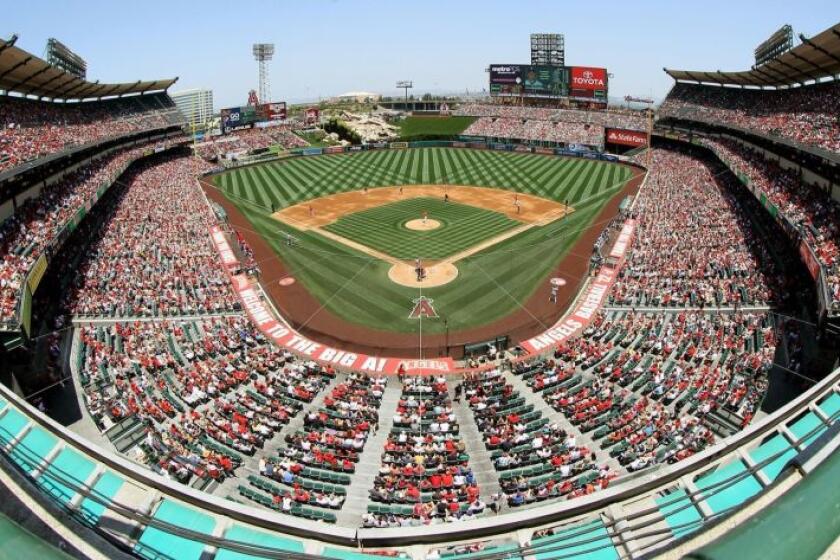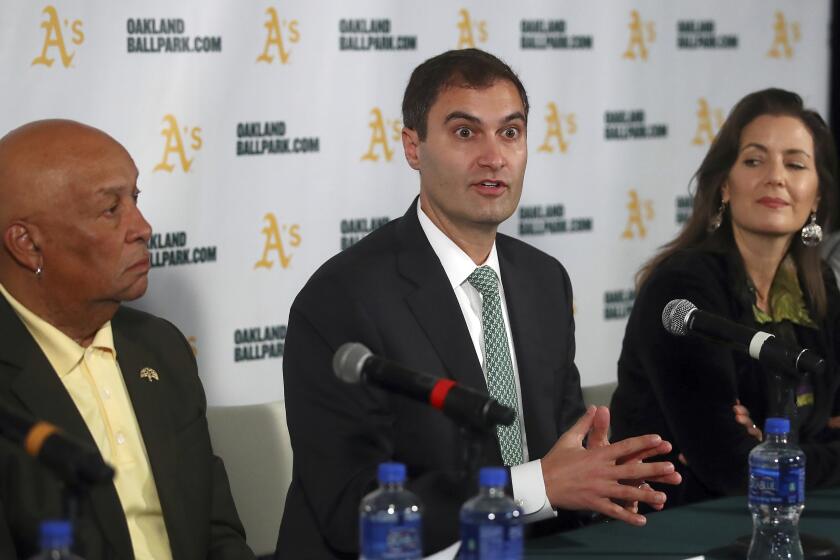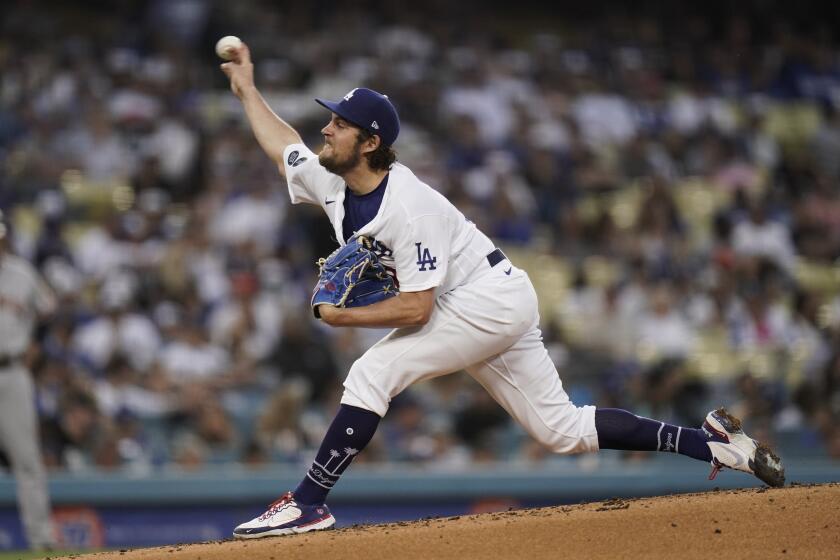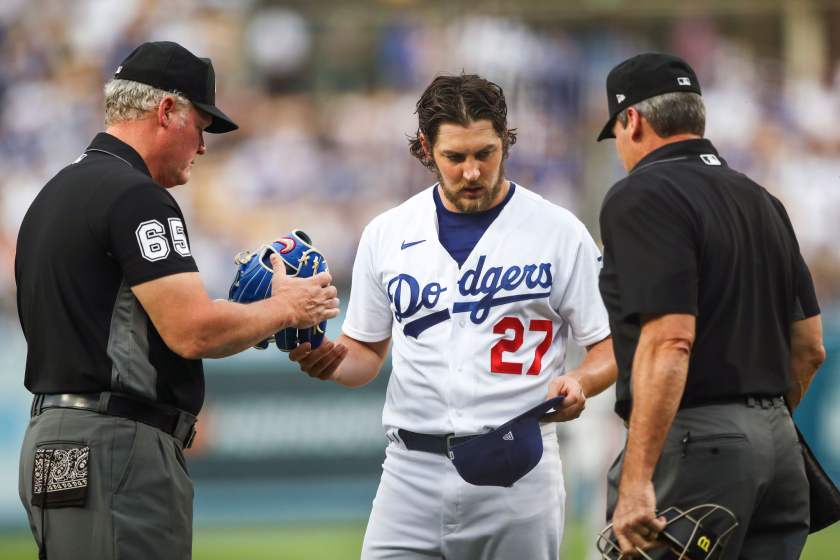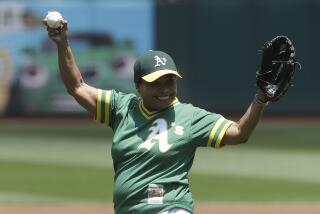Commentary: Time for Rob Manfred to save baseball in Oakland, or go down trying
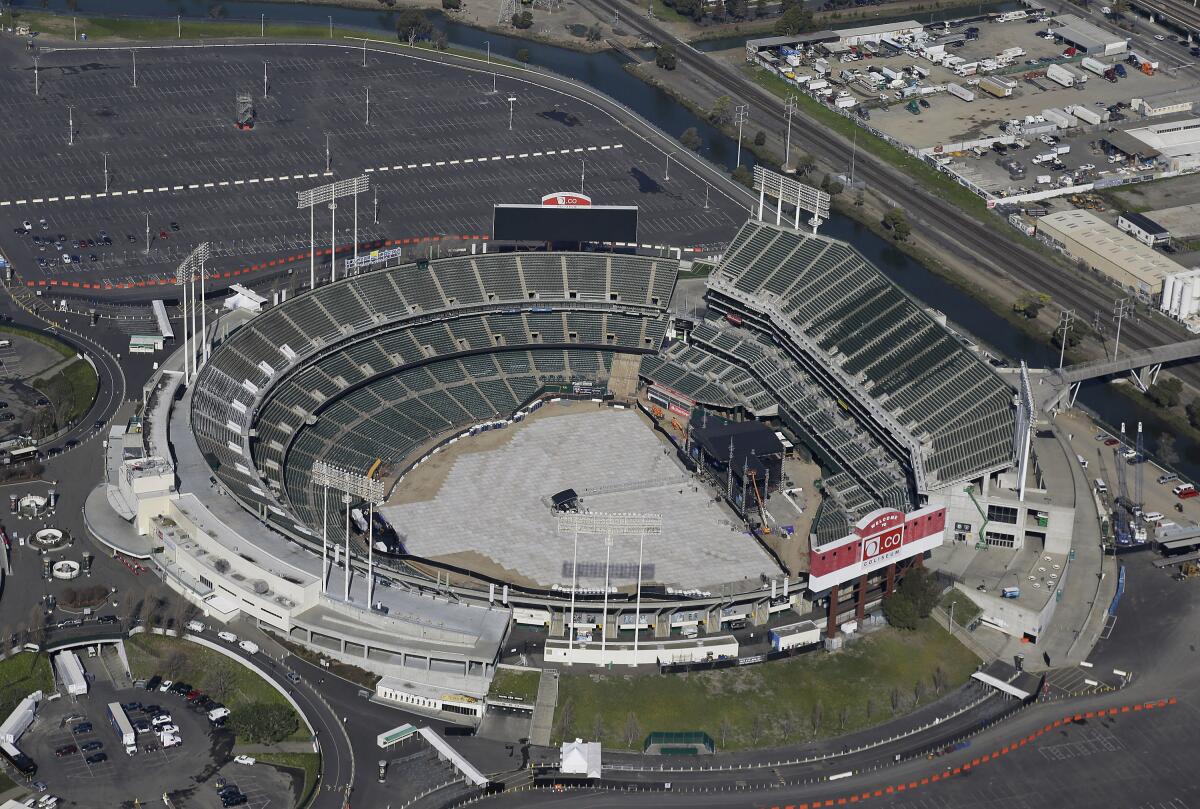
In 2019, the Angels’ ballpark project came before the Anaheim City Council. There was no suspense. The Angels had the votes lined up in advance, and the council approved the project.
On Tuesday, the Oakland Athletics’ ballpark project is scheduled to come before the Oakland City Council. The A’s are not sure what the vote might be, and they are not even in agreement with the city on what proposal the council should be voting on.
The A’s project is a spectacular triumph of imagination and a spectacular failure of political execution. The A’s are threatening to take their ball and go to a new home, frustrated by pursuing a new ballpark since the start of the 21st century with nothing to show for it.
In 2013, Angels owner Arte Moreno was frustrated, too. He had agreed with negotiators for the city of Anaheim on a ballpark project, but the mayor torpedoed it. Moreno bided his time, helped elect a mayor and city councilmembers who shared his vision, and got the deal done.
The agreement in which Anaheim sold Angel Stadium and parking lots to a company affiliated with team owner Arte Moreno may violate state law.
Dave Kaval, the A’s president, said the team has spent more than $200 million pursuing a new ballpark during the last five years. After so many millions and so many years, how can the A’s not have the votes?
“There’s other things going on in these communities beyond the ballpark and economic development,” Kaval said. “It’s hard for me to say.”
Yet, if the A’s truly are “rooted in Oakland,” as they like to say, it should be their job to get councilmembers to support the project, or help elect ones who will.
“This is where we are, unfortunately,” Kaval said.
In 2017, Kaval and owner John Fisher announced they would build a new ballpark on community college land in downtown Oakland. The A’s had not lined up support. The mayor said she disliked the idea. The college governing body rejected it.
In 2018, Kaval and Fisher announced they would build on the Oakland waterfront. The team cultivated community support. In April, the mayor threw her support behind the project. Two weeks later, the A’s announced their financial plan. The mayor disowned it within hours.
The Oakland Athletics and MLB insisted on a Tuesday vote on a new waterfront ballpark, but A’s President Dave Kaval said the team would not agree to the terms of the city’s proposal released Friday.
From a distance, the project looks like a win-win. The A’s would stay in Oakland, build an attractive billion-dollar waterfront ballpark at no cost to taxpayers, and arrange $11 billion in private investment to surround the ballpark with a vibrant neighborhood of homes, shops, restaurants, offices, parks and a theater.
The A’s are frustrated in part because the city’s proposal promises hundreds of millions in infrastructure financing without committing to any funding sources. The city is frustrated in part because the A’s proposal does not commit to a certain amount of affordable housing; the Angels pledged 15% of the housing units in their project and the San Francisco Giants pledged 40% in a similar project.
Major League Baseball leveraged the threat of the A’s moving to Las Vegas to force the Oakland council to schedule a vote. The next step, as Commissioner Rob Manfred made crystal clear last week, could be to set the A’s free to explore other relocation options from coast to coast, and into Canada.
The A’s used to get tens of millions of dollars in revenue-sharing money each year; the league cut the team off, in anticipation of a new ballpark. Would the league’s owners really prefer the A’s move to a smaller market, which would divert millions to the A’s yet again and deprive the owners of a potentially lucrative expansion opportunity? How about using some of those millions to help bridge the financial gap in Oakland?
“I am committed to Oakland as a major league site,” Manfred said in 2016. “If we were to leave Oakland, I think 10 years from now, we would be more likely than not looking backward, saying we made a mistake.”
Trevor Bauer is under investigation for sexual assault by the police and by MLB. How is the situation likely to unfold? What can the Dodgers do?
Manfred, reminded of that comment last week, said: “At the point in time that you come to the conclusion it can’t get done, whether you like the market or not, you have to find someplace else to play because you need a facility.”
Fisher does not want to build on the current Oakland Coliseum site, which is more than twice as large than the waterfront site.
“That is not a site that really fits the 21st century vision for baseball,” Kaval said. “It doesn’t have the downtown urban core near it. Because of that, it’s very hard for it to be successful for baseball.”
The last two major league ballparks to open, for the Atlanta Braves and Texas Rangers, are far from urban cores, with the teams building entertainment districts around their stadiums. The Angels’ project involves a neighborhood sprouting upon a parking lot with adjacent freeways and a transit hub, the same as would be the case at the Coliseum.
Fisher is not currently interested in selling the A’s. Perhaps, if the waterfront does not work, Manfred could find a local buyer who would build at the Coliseum, and suggest Fisher consider a deal.
If not, since the A’s are half-owners of the Coliseum site, Fisher could use profits from the development of that site to help finance the construction of a new A’s ballpark in another city. To avoid that nightmare scenario, would the A’s agree to sell their share of the site to the city of Oakland in the event they move?
Commissioner says joking comments by Dodgers president didn’t help MLB’s efforts to create a comfortable work environment for women.
“We’re focused on the waterfront site,” Kaval said.
Manfred ought to focus on Oakland, where the mayor does not vote and some members of the council have complained about a lack of communication from the A’s. Kaval has gotten the project to third base. Perhaps Manfred can get it all the way home.
Rickey Henderson, Joe Morgan, Frank Robinson, Curt Flood and Dave Stewart all called Oakland home.
In the most impactful moment of All-Star week, Manfred announced what he called the league’s largest charitable donation: $100 million to the Players Alliance, to expand diversity initiatives on the field, in the front office, and in communities. It would be a shame for MLB to make that announcement one week and give up on Oakland the next week.
Manfred has spent his entire career making deals. Maybe there is no deal to be made here, but there is a shot to persuade the council in Oakland, and the commissioner who said MLB would regret leaving Oakland ought to be the one taking that last, best shot.
More to Read
Go beyond the scoreboard
Get the latest on L.A.'s teams in the daily Sports Report newsletter.
You may occasionally receive promotional content from the Los Angeles Times.

